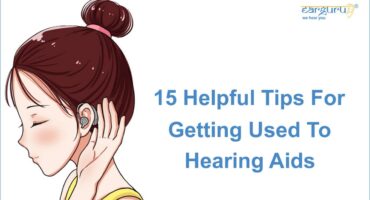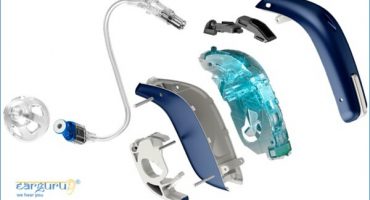If you are a regular hearing aid user, your hearing aids are the extension of your ears. You may be a careful user and take good care of them but what if hearing aids get wet due to unexpected rain? or you get into the shower without taking them off? It’s important that your hearing aids work trouble free and are protected from water, moisture, and sweat as hearing aids and water are a dangerous combination.
Problems like intermittent switches and crackling noise are more frequent during the rains. Though most brands offer water resistant hearing aids, they are not fully waterproof and do give problems. Read on to know what to do If hearing aids get wet and how to protect them from rain, moisture, and sweat?
How To Protect Your Hearing Aids from Rain?
Using hearing aid sweat covers is a good way to protect hearing aids from rain and sweat. The waterproof hearing aid covers are made of spandex nylon material and are water resistant and protect the hearing aids from water, sweat, and dust. It is ideal for people who travel as well as children playing outdoors and for people who sweat.
If you are a regular hearing aid user and commute to the office, it is natural that your hearing aids are exposed to humidity and at times, to rain and water. Here are a few tips to undo the damage if hearing aids get wet.
Can I Wear My Hearing Aids in The Rain?
You can certainly wear your hearing aids in the rain if you have waterproof hearing aids or water resistant hearing aids. If your hearing aids are not water resistant or waterproof and you are unexpectedly caught in the rain without an umbrella, your first instinct should be to protect your hearing aids from rain.
What To Do If Hearing Aids Get Wet?
We suggest you immediately remove your hearing aids, switch them off, and put them in a waterproof pouch. Always carry a waterproof pouch or a zip-lock bag. This will prevent further damage to the hearing aids. Then you can follow the steps given below.
Use A Soft, Dry Cloth for Drying Wet Hearing Aids
It is advisable to keep a soft, dry cloth in your bag. Once you reach your destination, wipe the hearing aid body carefully with a soft dry cloth. In case you do not have a soft cloth, you can use a tissue for drying wet hearing aids.
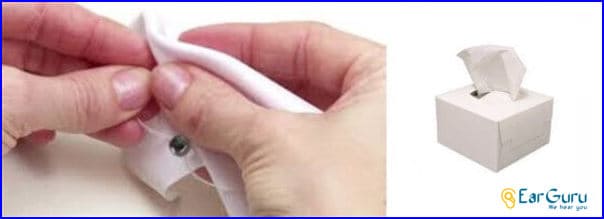
After cleaning the hearing aids from outside, open the battery compartment and remove the battery. Clean the battery compartment from inside with a clean dry cloth.
In case you are an ITC or a CIC user and cannot insert the cloth, use a Q tip or a cotton bud to clean all the water and the moisture from the battery compartment. It is important to clean and dry the battery as well. If the moisture remains on the battery, it will corrode and the hearing aid may start giving problems.
Use a Dehumidifier or a Stay Dry Box
If possible, keep a dehumidifier box or a Stay Dry box in your office, or use it when you reach home. Keep the hearing aids in the dehumidifier or a Stay Dry box after carefully cleaning from the outside and the inside of the battery compartment. Do not keep the battery in the dehumidifier box. As a practice, follow these simple home maintenance tips to extend the life of your hearing aids.
What is a Hearing Aid Dehumidifier?
A dehumidifier is a box or a container that contains a chemical substance used for hearing aid moisture removal. The moisture absorbing substance is known as a desiccant. The most common desiccant is Silica gel. The desiccant absorbs the moisture from the hearing aids kept in the dehumidifier box.
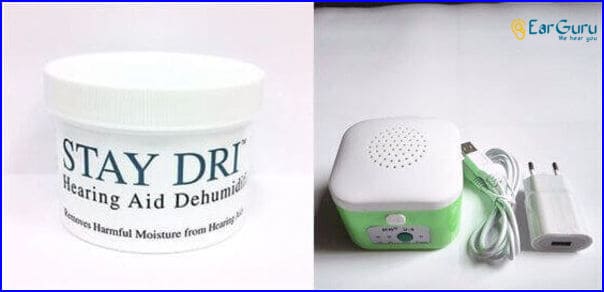
Do Hearing Aid Dehumidifiers Work?
Dehumidifiers are very effective at hearing aid moisture removal; regular use of dehumidifiers ensures trouble free performance.
There are two types of dehumidifiers. The electric dehumidifier for hearing aids is more effective. Some of the dehumidifiers blow warm air, this helps the warm dry air to reach the inner parts of the hearing aid and dry the moisture.
The basic non-electrical dehumidifiers use desiccants. Desiccants are substances that absorb moisture. Moisture can damage the delicate internal parts of the hearing aid.
How to Dry Out Wet Hearing Aids if You Don’t Have a Humidifier?
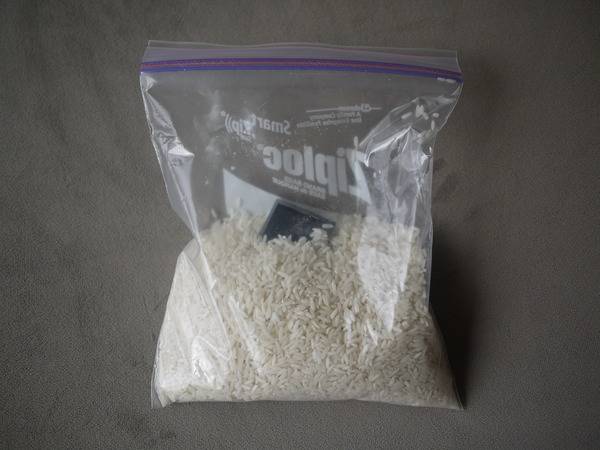
In case you do not have a hearing aid dehumidifier or you have run out of desiccant, do not panic. You have an awesome desiccant right in your kitchen, all you need is some rice. Yes! Rice is a very good desiccant; you can insert the hearing aid into a packet of uncooked rice.
Leave the hearing aids in the rice for a few hours, the rice will absorb the moisture. Use this hack in case of emergency and ensure that dust and rice particles do not get into the hearing aid.
Can I Use a Hair Dryer for Drying Wet Hearing Aids?
You can use a hairdryer if hearing aids get wet in the rain. But, under no circumstances use the hairdryer on the maximum hot air setting. Though some dehumidifiers blow hot air into the hearing aids, the air temperature is much lower than the air blown by the commercially available hairdryer.
In case you want to use a hairdryer, it should be at minimum hot air setting. If the air is too hot it can damage the delicate hearing aid parts.
Are Waterproof Hearing Aids Available?
100% waterproof hearing aids are not available but water resistant hearing aids are available from most of the reputed manufacturers.
What Are Water Resistant Hearing Aids?
Manufacturers coat the hearing aid body with a very fine layer of polymer material that is water resistant. The Nano coating does not allow the water droplets to stick to the hearing aid body. The water droplets roll off and do not seep into the hearing aid through the small openings, thereby protecting your hearing aids from water.
Can I Swim with My Water Resistant Hearing Aids?
It is not advisable to use water resistant hearing aids while swimming or while having a shower. These hearing aids can be comfortably used in normal rain and sweat situations. You do not have to panic and remove your water resistant hearing aids if you are unexpectedly caught in the rain. Though it is still advisable to clean and dry them after you reach home.
What are Waterproof Hearing Aids?
Waterproof hearing aids is a step ahead of water resistant hearing aids. The design of the hearing aid housing is such that there are no gaps or openings for the water to get in. The microphone is covered by a special membrane that allows only air and sound waves to enter but do not permit water to enter inside. There are no 100% waterproof hearing aids.
Can I Swim with My Waterproof Hearing Aids?
You can swim if your hearing aids are waterproof. The depth of the water at which they perform without getting damaged depends on the hearing aid IP rating or Ingress Protection rating. Refer to the user manual or consult your dispenser to know the hearing aid IP rating of the model you own.
The currently available models of waterproof hearing aids generally fall under IP67 or IP68 classification. The IP67 or IP68 rating protects your hearing aids from dust and water under certain conditions.
What Does IP67 or IP68 Hearing Aid IP Rating Mean?
IP means Ingress Protection, the protection rating of your hearing aid against dust particles and water.
The first numerical digit conveys the degree of protection from dust particles. The second numerical digit in the hearing aid IP rating conveys the degree of protection from water.
What Is IP67 Hearing Aid IP Rating?
In the case of IP67:
6 rating: Dust protection 100%.
The number “6” in the hearing aid IP rating means that your hearing aid has 100% protection against dust particles. 6 is the maximum score for dust protection.
7 rating: Water protection, 30 minutes at 1 meter depth.
7 indicates that your hearing aid can be underwater for not more than 30 minutes up to a maximum depth of 1 meter.
What Is IP68 Hearing Aid IP Rating?
In the case of IP68:
6 rating: Dust protection 100%.
8 rating: Water protection, 60 minutes at 1 meter depth.
The number 8 indicates that your hearing aid can be underwater for not more than 60 minutes up to a maximum depth of 1 meter.
Do IP67 Or IP68 Hearing Aids Work Under Water?
Please note that the above rating is for the protection of your hearing aids from water. It does not mean that your hearing aid will keep working underwater for 30 minutes or 60 minutes.
The irony is that the Zinc Air hearing aid batteries we use, require a continuous supply of air to produce power. Since air will not be available underwater, the hearing aids stop working. However, they start working once the hearing aids are outside water and the chemical reaction in the battery restarts as air is available.
Hearing aids and sweat or water do not get along. Protect your hearing aids from rain and water at all times.
Users should read the terms of the warranty. In some cases, the standard manufacturer warranty is not applicable if hearing aids get wet. Regular home maintenance will add a few years to the life of your hearing aids.
